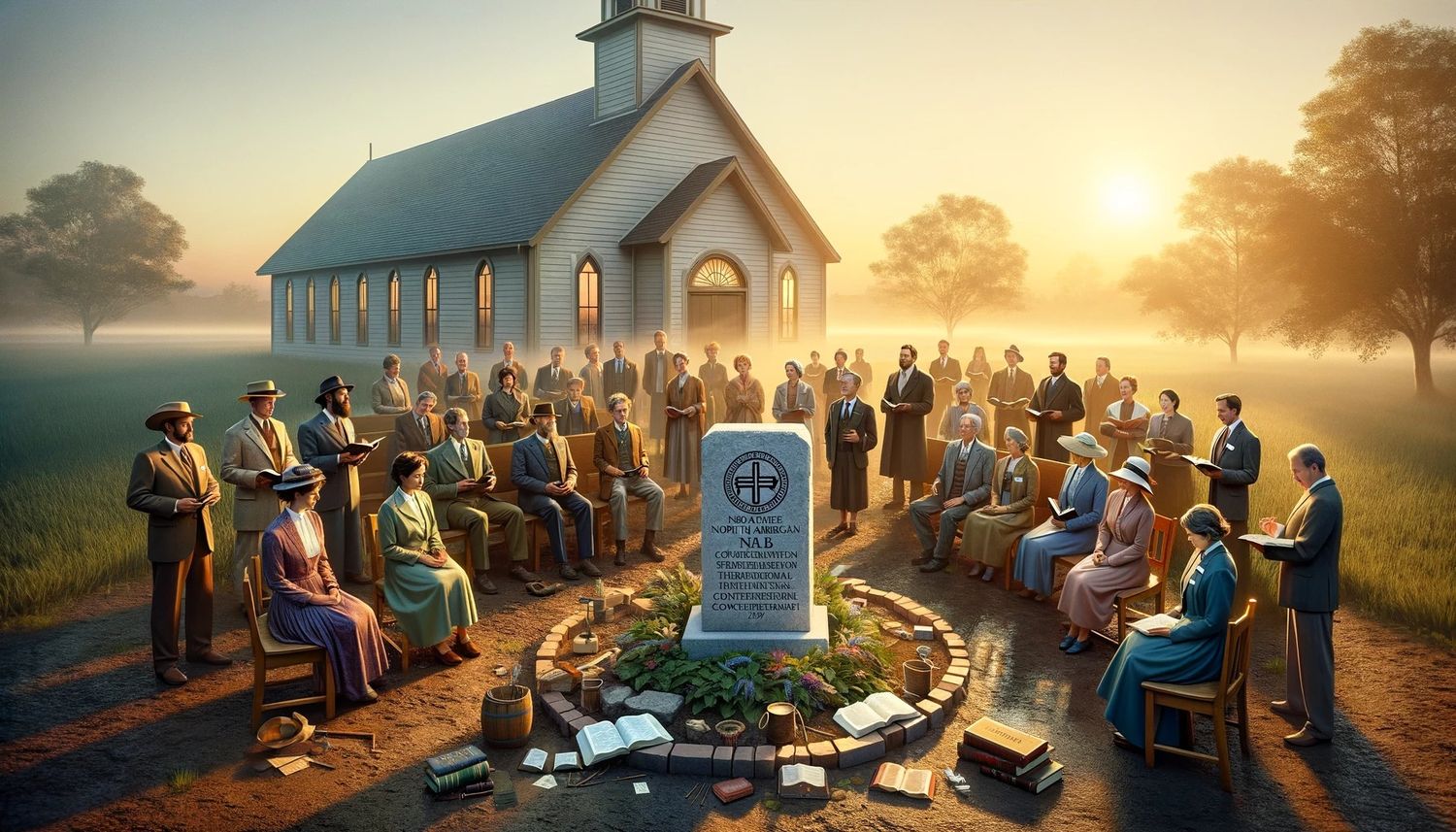Home>Theology and Spirituality>What Is A Vicar In The Lutheran Church?


Theology and Spirituality
What Is A Vicar In The Lutheran Church?
Published: March 3, 2024
Jason DeRose, Managing Editor at Christian.net, uses his expertise in religion and journalism to deepen understanding of faith's societal impacts. His editorial leadership, coupled with a strong academic background, enriches the platform’s diverse content, earning him recognition in both journalism and religious circles.
Discover the role and responsibilities of a vicar in the Lutheran Church, and explore the intersection of theology and spirituality in this vital position. Gain insight into the unique aspects of Lutheran vicarage and its significance within the church community.
(Many of the links in this article redirect to a specific reviewed product. Your purchase of these products through affiliate links helps to generate commission for Christian.net, at no extra cost. Learn more)
Table of Contents
The Role of a Vicar in the Lutheran Church
A vicar in the Lutheran Church plays a vital role in the spiritual and pastoral care of the congregation. They are ordained ministers who serve as assistants to the senior pastor or as leaders of smaller congregations. Vicars are responsible for providing pastoral support, leading worship services, and offering guidance and counseling to members of the church community. They also play a key role in teaching and spreading the teachings of the Lutheran faith, helping to nurture the spiritual growth of the congregation.
Vicars often work closely with the senior pastor to support the overall mission and vision of the church. They may be involved in planning and organizing various church activities, including outreach programs, community service initiatives, and educational events. In some cases, vicars may also be tasked with overseeing specific ministries within the church, such as youth groups, music programs, or adult education classes. Their role is multifaceted, encompassing both pastoral care and administrative responsibilities within the church community.
Read more: What Is The Lutheran Church
Qualifications and Training for Lutheran Vicars
-
Theological Education: To become a vicar in the Lutheran Church, individuals are typically required to complete a rigorous program of theological education. This often includes obtaining a Master of Divinity degree from an accredited seminary or theological institution. The curriculum covers a wide range of subjects, including biblical studies, theology, church history, pastoral care, and homiletics. This comprehensive education equips vicars with the knowledge and skills necessary to effectively serve as spiritual leaders within the Lutheran tradition.
-
Ordination: Upon completing their theological education, aspiring vicars undergo a process of ordination within the Lutheran Church. This involves meeting specific requirements set forth by the church, including theological examinations, interviews, and approval by church leadership. Once ordained, vicars are officially recognized as ministers of the church and are authorized to perform the sacraments, preach, and provide pastoral care to the congregation.
-
Internship and Practical Experience: In addition to formal education and ordination, vicars often participate in a period of internship or practical training under the guidance of experienced pastors. This hands-on experience allows vicars to apply their theological knowledge in real-world ministry settings, gaining valuable practical skills and insights into the pastoral role. It also provides an opportunity for mentorship and professional development as vicars prepare to assume greater responsibilities within the church.
-
Continuing Education and Professional Development: The journey to becoming a vicar does not end with formal education and ordination. Ongoing learning and professional development are essential aspects of the vocation. Vicars engage in continuing education programs, attend conferences, and participate in theological seminars to stay abreast of current issues, deepen their understanding of the faith, and enhance their pastoral skills. This commitment to lifelong learning ensures that vicars remain well-equipped to serve the evolving needs of their congregations and communities.
-
Commitment to Lutheran Doctrine and Tradition: Throughout their training and education, vicars develop a deep understanding and appreciation for Lutheran doctrine, theology, and tradition. They are immersed in the teachings of Martin Luther and the foundational principles of the Lutheran faith, cultivating a strong theological foundation that informs their ministry and pastoral leadership. This commitment to Lutheran identity and heritage is a fundamental aspect of the qualifications and training for Lutheran vicars, shaping their approach to spiritual care and religious instruction within the church.
Responsibilities and Duties of a Vicar in the Lutheran Church
-
Pastoral Care: One of the primary responsibilities of a vicar in the Lutheran Church is to provide pastoral care to the congregation. This includes offering spiritual guidance, counseling individuals and families in times of need, and providing comfort and support to those facing challenges in their lives. Vicars often visit the sick and homebound, offering prayers and communion, and are available to listen and offer guidance to those seeking spiritual counsel.
-
Leading Worship Services: Vicars play a central role in leading worship services within the church. They may be responsible for preaching sermons, leading prayers, and presiding over the sacraments, including Holy Communion and Baptism. Through their participation in worship, vicars help to create a meaningful and spiritually enriching experience for the congregation, fostering a sense of community and connection to the divine.
-
Teaching and Education: Vicars are involved in teaching and educational activities within the church, helping to nurture the faith and understanding of the congregation. They may lead Bible studies, facilitate discussion groups, and provide religious instruction to individuals of all ages. By sharing their knowledge of scripture, theology, and Lutheran tradition, vicars contribute to the spiritual growth and development of the church community.
-
Community Engagement: Vicars are often actively engaged in the broader community, seeking to build relationships and serve the needs of those beyond the church walls. They may participate in outreach programs, collaborate with local organizations, and advocate for social justice issues. By embodying the values of compassion and service, vicars demonstrate the love of Christ in action, working to make a positive impact on the world around them.
-
Administrative and Organizational Support: In many Lutheran congregations, vicars provide valuable administrative and organizational support. This may involve assisting with the coordination of church events, managing volunteer teams, and participating in decision-making processes related to the overall functioning of the church. Vicars work closely with the senior pastor and church leadership to help ensure the smooth operation of the congregation and the fulfillment of its mission and ministry.
-
Continual Learning and Growth: Vicars are committed to their own personal and professional growth, continually seeking to deepen their understanding of theology, pastoral care, and the Lutheran tradition. They engage in ongoing study, reflection, and dialogue, remaining open to new insights and perspectives that enrich their ministry. This dedication to lifelong learning enables vicars to adapt to the evolving needs of the church and the broader society, remaining responsive and relevant in their pastoral leadership.
-
Collaboration and Teamwork: Vicars often work collaboratively with other church staff, volunteers, and ministry leaders to achieve the collective goals of the congregation. They foster a spirit of teamwork and cooperation, recognizing the diverse gifts and talents within the church community and encouraging the active participation of members in the life of the church. By building strong relationships and partnerships, vicars help to create a vibrant and inclusive church environment.
In summary, the responsibilities and duties of a vicar in the Lutheran Church encompass a wide range of pastoral, educational, and administrative activities, all aimed at nurturing the spiritual well-being of the congregation and advancing the mission of the church. Through their multifaceted role, vicars contribute to the vitality and growth of the Lutheran community, embodying the values of faith, service, and love.
The Importance of Vicars in the Lutheran Church
-
Spiritual Guidance and Support: Vicars serve as spiritual guides and sources of support for the congregation, offering pastoral care, counseling, and comfort to individuals and families in times of need. Their presence and availability provide a sense of reassurance and connection to the church community, fostering a nurturing environment for spiritual growth and healing.
-
Continuity and Stability: Vicars contribute to the continuity and stability of the church by providing consistent pastoral leadership and support. Their presence helps to maintain a sense of continuity in the life of the congregation, especially during times of transition or change. Vicars offer a steady and reassuring presence, helping to anchor the church community in its faith and mission.
-
Teaching and Education: Vicars play a crucial role in teaching and educating the congregation, sharing their knowledge of scripture, theology, and Lutheran tradition. Through their educational efforts, vicars help to deepen the understanding of the faith among church members, equipping them to live out their Christian calling with wisdom and discernment.
-
Leadership Development: Vicars often provide mentorship and leadership development opportunities for emerging leaders within the church. By nurturing the gifts and talents of individuals, vicars help to cultivate a new generation of leaders who can contribute to the vitality and growth of the church community.
-
Community Engagement and Outreach: Vicars are actively engaged in community outreach and service, extending the church's presence beyond its walls. Through their involvement in social justice initiatives, community partnerships, and outreach programs, vicars embody the values of compassion and service, demonstrating the love of Christ in action.
-
Collaboration and Teamwork: Vicars foster a spirit of collaboration and teamwork within the church, working alongside other staff members, volunteers, and ministry leaders to achieve common goals. Their ability to build strong relationships and partnerships contributes to the overall unity and vibrancy of the church community.
-
Pastoral Succession and Development: Vicars often play a role in the training and development of future pastors and church leaders. By providing mentorship and guidance to individuals discerning a call to ministry, vicars contribute to the ongoing succession and development of pastoral leadership within the Lutheran Church.
-
Adaptability and Innovation: Vicars bring a spirit of adaptability and innovation to the church, responding to the evolving needs of the congregation and the broader society. Their fresh perspectives and creative approaches help to ensure that the church remains relevant and responsive to the changing dynamics of the world around it.
In essence, the role of vicars in the Lutheran Church is of paramount importance, encompassing spiritual, educational, and community-oriented dimensions. Through their dedicated service and leadership, vicars contribute to the vitality, growth, and mission of the church, embodying the values of faith, compassion, and service in their ministry.
Challenges Faced by Vicars in the Lutheran Church
-
Pastoral Demands: Vicars often face the challenge of balancing the pastoral demands of the congregation, including providing care and support to individuals facing various personal and spiritual struggles. The emotional and psychological toll of consistently addressing the needs of others can be demanding, requiring vicars to maintain their own well-being while tending to the needs of the community.
-
Time Management: Juggling multiple responsibilities, including leading worship services, teaching, and administrative tasks, can present a significant challenge for vicars. Effective time management becomes essential as they strive to fulfill their diverse duties while ensuring that each aspect of their ministry receives the attention it deserves.
-
Navigating Conflict and Disagreement: Vicars may encounter challenges related to navigating conflict and disagreement within the congregation. Addressing differing perspectives on theological matters, church governance, or interpersonal issues requires skillful communication and a commitment to fostering unity and understanding within the church community.
-
Financial Pressures: In some cases, vicars may face financial pressures, especially in smaller congregations with limited resources. Balancing the financial realities of the church with the pastoral needs of the congregation can be a challenging aspect of their role, requiring prudent stewardship and creative solutions to support the ministry.
-
Emotional Resilience: The nature of pastoral care often exposes vicars to the emotional burdens of others, including grief, loss, and personal struggles. Developing emotional resilience and maintaining a healthy perspective in the face of these challenges is crucial for vicars to sustain their own well-being and effectiveness in ministry.
-
Leadership Transitions: Vicars may encounter challenges related to leadership transitions within the church, especially when assuming new roles or navigating changes in senior leadership. Adapting to new dynamics and expectations while maintaining continuity in the church's mission and ministry can present unique challenges for vicars.
-
Cultural and Generational Diversity: Serving a diverse congregation with varying cultural backgrounds and generational perspectives can pose challenges for vicars. Understanding and addressing the unique needs and preferences of different demographic groups within the church community requires sensitivity, adaptability, and a commitment to fostering inclusivity.
-
Self-Care and Boundaries: Vicars face the challenge of establishing healthy boundaries and practicing self-care amidst the demands of ministry. Balancing personal well-being with the sacrificial nature of pastoral service is an ongoing challenge, requiring intentional efforts to prioritize physical, emotional, and spiritual health.
-
Navigating Change and Innovation: Embracing change and innovation while honoring tradition and heritage can be a challenging balancing act for vicars. Introducing new initiatives, adapting to evolving societal trends, and addressing the changing needs of the congregation requires discernment and a willingness to navigate the complexities of change.
-
Professional Isolation: In some contexts, vicars may experience a sense of professional isolation, especially in smaller or rural congregations. Building a support network, seeking mentorship, and finding opportunities for collaboration and professional development can be essential for combating feelings of isolation and fostering a sense of community among vicars.
Navigating these challenges requires resilience, adaptability, and a deep commitment to the vocation of vicar within the Lutheran Church. By addressing these obstacles with wisdom and grace, vicars can continue to fulfill their vital role in shepherding and nurturing the church community.















